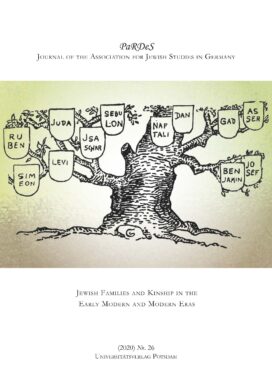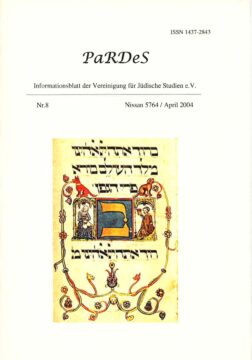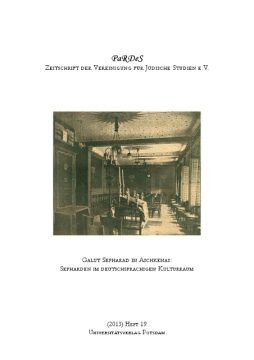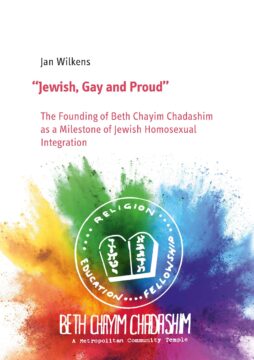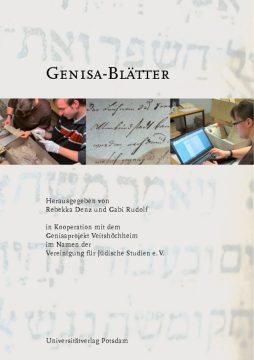Mirjam Thulin, Markus Krah, Bernd Gausemeier, Frank Mecklenburg, Annegret Oehme, Tamás Máté, Lisa Gerlach, Viktoria Gräbe, Ekaterina Oleshkevich, Michael Wermke, Rafael Arnold , Stephan Wendehorst, Suanne Talabardon, Devi Mays, Judith Müller, Yaakov Herskovitz, Katja Garloff, Katharina von Kellenbach, Marcus Held, Karl Erich Grözinger
Mirjam Thulin; Markus Krah; Bianca Pick (eds.)
ISBN: 978-3-86956-493-7
180 pages, Paperback
Release year 2020
Series: PaRDeS : Zeitschrift der Vereinigung für Jüdische Studien e.V. , 26
10,50 €
Non-taxable transaction according to § 1 (1) UStG/VAT Act in combination with § 2 (3) UStG/VAT Act a. F. Providing this service, the University of Potsdam does not constitute a Betrieb gewerblicher Art/Commercial Institution according to § 1 (1) No. 6 or § 4 KStG/Corporate Tax Act. If the legal characterization of our business is changed to a commercial institution subsequently, we reserve the right to invoice VAT additionally. zzgl. Versandkosten
Recommended Books
-
 2004
2004Nathanael Riemer, Asaya Asbaghi, Elisabeth Eggimann Gerber, Eveline Goodman-Thau, Elvira Grözinger, Hans-Michael Haußig, Jan Peter Jankrift, Stephanie Kowitz, Edith Lutz, Gabriel Miller, Heike Tröger, Manfred Voigts, Jenny Warnecke
Nissan 5764 / April 2004
2,50 €Non-taxable transaction according to § 1 (1) UStG/VAT Act in combination with § 2 (3) UStG/VAT Act a. F. Providing this service, the University of Potsdam does not constitute a Betrieb gewerblicher Art/Commercial Institution according to § 1 (1) No. 6 or § 4 KStG/Corporate Tax Act. If the legal characterization of our business is changed to a commercial institution subsequently, we reserve the right to invoice VAT additionally.
zzgl. Versandkosten
Add to cart -
 2013
2013Rebekka Denz, Dorothea M. Salzer, Stephanie von Schmädel, Amor Ayala
Galut Sepharad in Aschkenas
11,00 €Non-taxable transaction according to § 1 (1) UStG/VAT Act in combination with § 2 (3) UStG/VAT Act a. F. Providing this service, the University of Potsdam does not constitute a Betrieb gewerblicher Art/Commercial Institution according to § 1 (1) No. 6 or § 4 KStG/Corporate Tax Act. If the legal characterization of our business is changed to a commercial institution subsequently, we reserve the right to invoice VAT additionally.
zzgl. Versandkosten
Add to cart -
 2020
2020“Jewish, Gay and Proud”
9,00 €Non-taxable transaction according to § 1 (1) UStG/VAT Act in combination with § 2 (3) UStG/VAT Act a. F. Providing this service, the University of Potsdam does not constitute a Betrieb gewerblicher Art/Commercial Institution according to § 1 (1) No. 6 or § 4 KStG/Corporate Tax Act. If the legal characterization of our business is changed to a commercial institution subsequently, we reserve the right to invoice VAT additionally.
zzgl. Versandkosten
Add to cart -
 2015
2015Genisa-Blätter I
10,50 €Non-taxable transaction according to § 1 (1) UStG/VAT Act in combination with § 2 (3) UStG/VAT Act a. F. Providing this service, the University of Potsdam does not constitute a Betrieb gewerblicher Art/Commercial Institution according to § 1 (1) No. 6 or § 4 KStG/Corporate Tax Act. If the legal characterization of our business is changed to a commercial institution subsequently, we reserve the right to invoice VAT additionally.
zzgl. Versandkosten
Add to cart
Publisher Info
Contact
Potsdam University Library
University Press
Am Neuen Palais 10
14476 Potsdam
Germany
verlag@uni-potsdam.de
0331 977-2094
0331 977-2292

